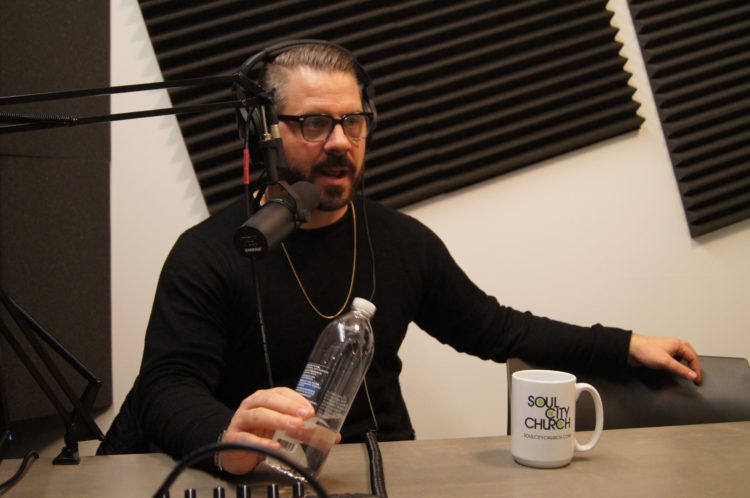

At a time when most people are leaving organized religion, Soul City Church is growing. And, like its West Loop Chicago neighborhood, the growth is rapid.
A large percentage of those who come to Soul City Church are younger adults – or Millennials as marketers would call them – A group that brands covet and religion doesn’t seem to connect with. Therefore, we invited Lead Pastor/CEO Jarrett Stevens to preach his brand gospel.
“We had the opportunity to learn early from Seth Godin and Jason Fried,” said Stevens. “So, in many ways, our church runs like a startup. He adds, “but as we scale it becomes clear our people are our brand.
Today’s guest is Jarrett Stevens, he’s the lead pastor and CEO of Soul City Church, it’s one of the fastest growing churches in Chicago. And we’re going to talk about several issues we’ve heard on the Brand Lab Series from rapid growth, to branding, to fundraising, to employee engagement, and much more.
The reason why I wanted to have Jarrett on the show is that he co-founded and is running a very fast growing church that is attracting people in droves when most people are leaving the church. They operate it in so many ways like a start-up, and I think there’s a lot that people can learn in terms of how they’ve built a brand, how they raise money, how they provide good customer experience.
Why don’t we just start with sharing a little bit about your background and Soul City Church just to set the stage for our listeners.
Yeah. I grew up around church. My mom was on staff at a church when I was growing up, so that was very familiar to me but not something I ever thought I’d be a part of, my life, career wise. Until I got to college, I was volunteering, helping the little church that I’d grown up at. I was volunteering there, and that’s really where I got this vision, “Well, what if I could do this with my whole life? What if this could be really what I give my life to, is this kind of work?”
At that time, I thought it was giving my life to middle school students and working with middle school students. Thankfully, I expanded the vision beyond that, because I don’t know if I could have done that for my whole life. But that led to getting involved at a church here in Chicago. I grew up in the Bay Area, San Francisco. And so, I moved out here to Chicago to get involved in a church called Willow Creek Community Church. It’s a pretty well-known church in my industry, for lack of a better word.
My wife and I got married, and we were on staff there for 11 years. And left there to work at a church called North Point Community Church in Atlanta, very similar to Willow Creek. Each of these churches are around 25,000- 40,000 folks. So, we dove into the deep end early on, and that gave us a real vision for what to do. So, that led us to starting a church in the city. We took all the experiences we had, and we moved back into the heart of Chicago. We live in the West Loop, not far from you, Brian. And started a church here about seven years ago.
So, in many ways Soul City is like a start-up. You’ve been so fast growing. Talk about this journey.
Yeah. Well, in every way it was a start-up. And I think we’re just coming out of some of our start-up days. I’d mentioned we worked at these two incredible churches, great churches. But we weren’t ever the point leaders there, and there were so many staff members, and there were so many resources, we didn’t have to really think about that a ton. All the while though, we had this vision for maybe doing our own thing, taking all that we had learned, and doing it in the context of the city. Both of those churches were in the suburbs, suburbs of Chicago and the suburbs of Atlanta. So, when we left the church we were working at in Atlanta to move back to the city, we moved into Humboldt Park, here in Chicago.
We hit the ground running at about a mile a minute. It felt like we were hustling and not getting anywhere in those early days. And so, we didn’t get paychecks, we cashed in our 401ks, like everything we’d saved up to that point. There was no outside funding so we had to raise all the capital ourselves.
For about two years, we really planned, and plotted, and prayed about this. So, we really had to raise every dollar from the get-go. And so, we went 18 months without a paycheck. I called every church I’d ever spoken at and said, “Listen, I need you to bring me back and I need you to pay me more than you’ve ever paid me before because we’re starting this thing and everything we have is going to starting this thing.” There were some folks who came to start it with us, we had a team, a handful of what we’d called staff, even though none of us were paid in the beginning. So, there were about six of us, and then about another 30 core volunteer folks in the beginning.
And yeah, I can’t stress to you enough, it was a start-up in every single way. And what was great for us at the time was, this was right around ’09, great time to start a church when the economy is just completely tanked. So, wonderful time to ask people to give money. When everyone’s freaking out about their money.
But we had the privilege of having writers and thinkers like Seth Godin, Jason Fried from 37signals. His book, REWORK, had just come out right when we were starting the church. We’d all read that on our own.
It’s an incredible book. And what was fun for us when we started was the location where we ended up starting the church is just around the corner from 37signals. So just because we had nothing to lose, I started reaching out and building a relationship with Jason and said, “Can you help us? Can you help us think of this thing differently?” Instead of just doing the traditional model for a church. It’s pretty fun to say to him, “How would you do a church? How would you design this thing?” And he was very generous and very helpful.
So, we had a real privilege of having access to some folks who are already thinking differently about brand, about start-up, about entrepreneurialism. And then we were just taking all of that and applying that to something that is not necessarily a new thing. The church has been around for 2,000 years so we were trying to figure out how to do all that we were learning within the context of an actual church.
So yeah, it was a start-up in every way. And I would say, we’re just now in that season of, we can’t keep operating like it’s a start-up anymore. We keep saying all the time, “What got us here, won’t get us there.” And it is just true. We’ve had to make some real shifts to our structure, the way we do what we do, because that start-up mode was just full frenzy, every which way but loose.
We have talked to a lot of our guests about how the start-up phase is incredibly hard, but at the same time almost anyone can do it. And it’s the scale up period that gets challenging.
I know we’ll talk a little bit more about that in a few minutes but you also mentioned something which was brand. And we’ve talked for many episodes about how brand is so much bigger than just the marketing component. Having been inside your church a few times, having met a lot of people there, I see how well you execute brand. What’s your secret sauce there?
I don’t know if there’s a secret sauce so much as just trying to consistently do what we do with excellence. This is just the stuff we could have never picked, or controlled, or predicted so we ended up getting this space that we prayed about, we walked around, we’d look for locations to start up. And it just happened to be this old warehouse space in the West Loop of Chicago, right when the West Loop was about to really blow up.
What was amazing was, we move in there and there’s this amazing, generous, family that gave us this huge 22,000 square foot space, rent free for the first two years of our church. We didn’t even know you could ask for that. You know what I mean? We were trying to figure out how to make it all happen. So, we move in and as I mentioned, our neighbor just a block north of us is 37signals. One block west of us is Threadless. And little did we know, a couple years later, Google would move into the neighborhood. Now McDonald’s is moving into the neighborhood.
We figured, there’s some things that we’re going to do because that’s what churches do. It is a spiritual community. We’re not trying to reinvent that wheel. This is a spiritual community where anyone and everyone is welcome, anyone can come. Some of those things were non-negotiables to us. Everyone needs to feel like they’re loved, wanted, accepted. But past that, everything’s open for possibility, everything’s open for exploration. So, for us, that’s really where it started. We were planning and even planting this church in Chicago while we were still living in Atlanta. So, we had this vision for the church in Chicago, a neighborhood church where everyone’s welcome, everyone’s wanted, and we have purpose in why we’re there, and all that stuff. But it’s a little hard to cast that vision to people in Chicago when you don’t live there.
So, what we decided to do while we were waiting to sell our house, again, the economy had tanked, so we started with a blog. I mean, this is ’08 when we started the blog. And we just started journaling about our journey, about our process. We started writing about it, sharing about it, casting our vision online. That was kind of getting who we were or who we were about to be, out there way further than if we had just sent some mailers out to the neighborhood once we got to Chicago.
For us, I mean, we tried to keep it as simple and clean and clear as possible. We had three sets of logos in the beginning, we’re still using those to this day. We’ve really had this commitment to simplicity and consistency, so in the very beginning we created a design manifesto that had our colors and our fonts and all that stuff, just so that we could have excellence in everything we did. That’s a huge value for us, to do the best we can with what we have. That’s how we define excellence, doing the best we can with what we have. And then simplicity, let’s keep it clear and clean and simple; if it doesn’t need it, get it out. We just want to keep doing that in every aspect of what we do.
But Brian, really the number one brand we have isn’t a logo, it isn’t anything on our website. It really is, for us, it is the people. And we can have the greatest brand and identity, we can have all that dialed in, but if our people aren’t kind or accepting, loving or generous people, like if our people aren’t good people to be around, that is our brand. All that other stuff pales in comparison to that.
And so, for us, again, we’ve done all this work and tried to be intentional with these things but at the end of the day, it’s the people that are a part of it. Especially in, for lack of a better word, our industry, that really is all we have, the people that are part of this, that come, that call this church their home, that makes Chicago the place where they want to plant their roots, that’s our brand. So, that’s what I’m so thankful for because we just have some absolutely incredible people.
It sounds like you’ve done very well with raising money for Soul City Church. How did you execute that?
Yeah, that’s a unique thing, to have a source of income that is completely voluntary. Especially for us, the way that we started with no outside funding, no denomination, and no other church organization starting us, we really had to raise every dollar on our own. So early on, we had access to, just because of where we lived in Atlanta, a guy named Jim Shepherd and he does a really great job of helping churches raise money in a healthy and helpful way. He told us over coffee one time, he said,
“Listen, you guys. My wife and I both pastor the church. My wife’s a lead pastor and I’m the other lead pastor.” And he said, “You guys need to not only get good at raising money, you need to learn to love raising money. Not because you love money and all that but because that’s really one of the main things you do and no one will be able to do it better than the point leader, the point person.”
And so, I remember from that going, “Okay, I’ve never had to do this before.” We worked at churches where that wasn’t something we ever had to think about and so we really had to go to school to learn how to ask people to invest in a vision that they will not see a direct monetary return from, but what we believe is they’ll see a far greater return, they’ll see people’s lives changed, marriages improved, they’ll see families growing, they’ll see the community loved and served, that’s what they’re investing in.
And so, we just had to practice, and practice, and practice and I’m very grateful for the folks that let us practice on them, raising resources especially in the beginning. So again, these are all things that I never imagined we’d be doing starting a church, but I’m so grateful for the folks that God brought around us to help us, to learn that honestly in an early stage in our church. What I’ve learned as one of the point leaders is, this really is something I’m going to be doing for the rest of the life of this organization-encouraging people to get on board with the vision and to invest in it.
I think, one of the greatest learnings is that I’m not asking them to help us out, I’m not asking them to keep the lights on, or to help us hire more staff. People may give to that once or twice, but what we try and do is really capture the vision of what this whole thing is about, and to show that, to show that through stories, to show that through stats and numbers, to invite people to come and experience what’s happening in our church. There’s just no other way around it for us.
Without that clear, compelling vision, it’s really challenging to raise resources and it’s hard to keep the lights on if you can’t raise resources. We pay our mortgage, we pay salaries, and we do all the things that a normal business does and on top that, you know, soul. I mean, so we have this other thing at the end of the day, that we’ve got into this for.
There’s a practice around the Christian faith of giving 10% to the local church, right? There’s a lot of different interpretations on that, so we just said, before we ever ask anyone to do that, we’re going to set up our budget to do that as a church. So, we’re able to fund initiatives in our city and around the world. 10% off the top of our annual budget goes outside our doors and is invested in local partnerships we have with great organizations, great non-profits here in the city, some goes into helping families in our community who are financially struggling, who are in need. So, we just set ourselves up to begin to say, “Hey, we’re going to do this as an organization before we ever ask you to do this with our organization.” And I think that has given some credibility, some integrity to what we’re doing.
You’re talking so much about the necessary skills and experiences that entrepreneurs need to have from building teams to raising money, to building brands, to so many different things but there really is a nice social entrepreneurship component to Soul City. I had the opportunity to get involved with some of the stuff you’ve done with some of the schools outside of the neighborhood and a lot of the other programs. That’s really exciting to see that too.
It sounds like the community is just a supportive, wonderful place. In a time when many people are leaving organized religion, to what would you attribute your success?
I think it really is the people. I believe from my place where I’m coming from, that God is drawing people, that people have a spiritual hunger in them and they’re looking, they’re searching, I think most people really are at some level. And so, there’s that which is happening differently for every person. I just think when people get around some of our folks, they’re just good people and they’re loving and they’re kind and they’re accepting, and they’re trying to figure this out and no one’s pretending to be perfect and no one’s pretending to have it all together. And I think there’s just something really refreshing. I think there’s something really inviting about that.
I’d love to tell you that it’s the preaching and the teaching that I do but I don’t think it’s that. I’d love to tell you that it’s our branding and our logo and all that. I don’t think it’s that, I really think there’s a spiritual hunger that most folks genuinely have. And too, I think they meet the folks at our church and they just feel like, “Well, these people are like me. If people like this are here, well then certainly there’s a place for me here.” And we would have that all the time.
We’ve had folks in our church where they’ll see each other, they’ll see a friend that they know from their bar days or from just last weekend at the bar, or whatever it was. And they’ll go, “Wait, you go here? Oh, you go here? Yeah, what are you doing here?” I think there’s that feeling of, “Gosh, well, maybe there’s a place for me here too.” And I just think, that is incredibly inviting and captivating for folks to feel like they can have a place.
Well, it’s definitely an inclusive environment, and you talked a little bit earlier about some of the things that in your industry people find, and fairly so, very important to their own belief system but many times I think on the outside looking in that seems to be exclusive where I feel like the brand that you have created and your people have created has been very inclusive and along the lines of the experience that you just alluded to as well. You have many pathways which people can experience beyond just what most people would think of church whereas you go on Sunday, you have small groups, you have community programs, you have programs for youth in the city, that’s how my family found your church.
So the question that I would have from just more of a brand customer experience point of view is, how do you make sure that all those different pathways into Soul City all provide a similar experience?
Well, it was a lot easier when we were smaller. The more we’re growing, the harder it is. Well, we had it happen recently. There’s a ministry within our church that’s growing significantly within the context of our church and so they started an Instagram feed and started trying to keep people up to date with that. It doesn’t totally look like the rest of what we do and then there was some inconsistency when they were posting. And so, we have to go, “Okay, awesome idea. Let’s bring that back and how can we help support this? Is this the best expression of what we’re doing?”
So, even down to little stuff like that to making sure that we’re not starting things that we’re not going to be able to finish or that don’t totally fit within the bigger picture, and then also just having a lot of grace with the fact that we’re figuring most of this out as we go.
So, I wanted to switch over and ask you about how you lead your staff. How do you keep your volunteers engaged?
That’s a great question. We have, let’s see, today about 17 paid staff. But then we have a couple hundred volunteer folks in our church and that really is the heartbeat, the lifeblood of our church, are these amazing folks who have very full and complicated lives and dreams and aspirations and day jobs. To say, “We’re going to put the mission of this thing on our back, and we’re going to show up, and show up early before anyone else, stay later past everyone else, we’ll pick up trash, we’ll hold doors, we’ll play guitars,” that is to me, honestly, is amazing.
We try to keep volunteering clear, clean, consistent and we really try and align it with people’s passions. What we would call ‘their giftings.’ So, we have folks that are incredible with finances, accounting, folks that run their own businesses with this stuff. And on top of what they do for their day job, they volunteer to help keep our financial house in order. They’re great at it. Their volunteering goes further, faster because it’s coming out of their passion and their gifting. And so that’s what we really work to do with all the amazing folks who volunteer at our church. Find out what they’re good at, find out what they love, and then find a meaningful place for them to contribute bigger than themselves. Then when we get that right, I think it’s fun to watch.
So, Jarrett as we wrap up, how can people learn more about you or Soul City?
You can learn all about the church at soulcitychurch.com. And that has everything that we do, and who we are, and all that kind of stuff. And then I have my own site where I do writing and all that kind of stuff at jarrettstevens.com. You can also find us on Instagram and Twitter and Facebook just by putting in our name.
Jarrett, thank you so much for being on the Brand Lab Series. It was very inspiring to hear some of your stories and your early start-up days
Thank you very much for having me. I’m really honored.
Tags: Nonprofit, Brand and Marketing, Entrepreneurship
Enjoyed this episode? View all of our episodes now.


